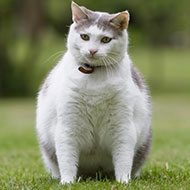
Plan advocates the use of body condition scoring
A cohort of veterinary organisations have launched a new action plan for tackling obesity in companion animals.
The BVA, the BVNA, the BVZS and the BEVA have joined forces to produce 30 recommendations for how vets, practices and the sector as a whole can work to address obesity in dogs, cats, horses, donkeys and rabbits.
It comes in response to research* that found obesity and overfeeding are among the top three most pressing animal welfare concerns of companion animal vets.
“As veterinary professionals, we have a huge part to play in managing and preventing obesity in companion animals,” said BVA President, Daniella Dos Santos. “This is a serious and growing issue that can cause or exacerbate a wide range of health and welfare problems, so it’s incumbent on us to give clients clear and consistent advice and support to help their animal maintain a healthy weight.”
Launched during National Obesity Week (14-20), the plan advocates the use of body condition scoring for identifying, preventing and managing weight gain and the development of obesity in animals. Vets and vet nurses are urged to monitor the body condition score and weight of a cat, dog or rabbit during their growth phase, and to continue to check these measurements at least once a year.
The position also recommends that staff should be well trained in using body scoring scales consistently for the species they treat, and practices should have policies in place that support vets and vet nurses to speak to clients about weight management for their pet in a timely and sensitive way.
BVNA junior vice President Jo Oakden said: “This policy position and action plan provides the tools to veterinary professionals so that they can gain the knowledge they need to take a lead in tackling obesity. If we are unified in our approach, we stand a better chance at making an impact in this epidemic."
BEVA President Tim Mair added: “Obesity in horses has become a significant health problem in recent years, especially in leisure horses. In view of the clear association with laminitis, the management of obesity is now a high priority in equine practice, and veterinary surgeons should play a pivotal role in tackling the complex issues surrounding obesity and the factors that contribute to it.”
*BVA’s 2017 Spring Voice of the Veterinary Profession Survey.



 The Veterinary Medicines Directorate (VMD) is inviting applications from veterinary students to attend a one-week extramural studies (EMS) placement in July 2026.
The Veterinary Medicines Directorate (VMD) is inviting applications from veterinary students to attend a one-week extramural studies (EMS) placement in July 2026.